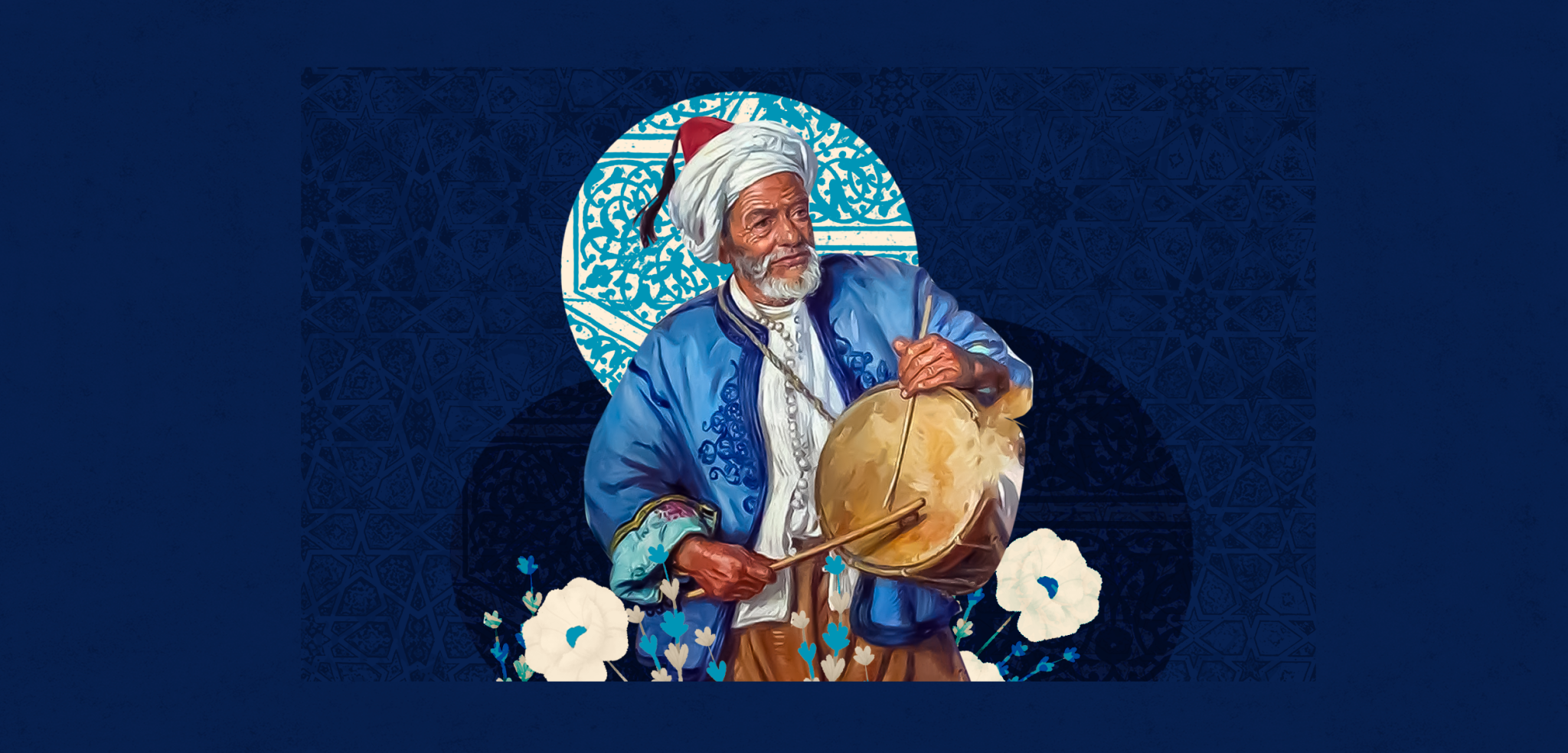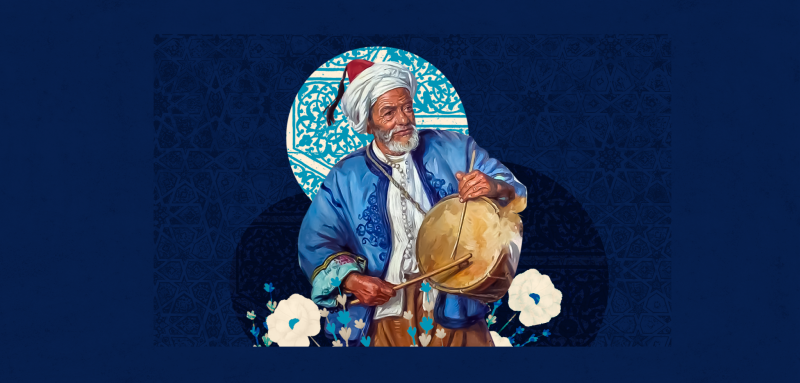In years gone by, a Ramadan cannon was set up in several corners of the Syrian capital Damascus. Minutes before the daily Maghrib call to prayer throughout the month of Ramadan, a municipal employee would fire the cannon, announcing iftar, the time to break one’s fast. Radio Damascus and Syria TV would announce the end of the fasting day only after hearing the sound of the cannon. The cannon is also fired during suhoor, the final meal Muslims eat before sunrise and the next full day of fasting.
Thirteen years ago, with the start of the war, Syria’s famous Ramadan cannons were retired in favor of other cannons: ones that did not deliver the same joy to the hearts of Syrians. Since the war, due to the winds of change and modernity, and with the loss of Damascus’s beloved Ramadan cannon, many other unique features of Ramadan have similarly been erased.
The Ramadan greetings, “Ramadan Kareem”, or “Ramadan Mubarak”, for example, are now circulated via a WhatsApp message, devoid of personal touch. The greeting was previously used in person, at family gatherings in celebration of the start of the Holy Month.
Previously, in the week leading up to Ramadan, the streets and alleyways of Damascus were lined with colorful flags and banners. Stores in Damascus would hang lights up and fanous Ramadan lanterns, bright enough to illuminate their selection of typical Ramadan products, including sweets, drinks, and more. Festive rituals such as these have almost disappeared, due to the decline in purchasing power among Syrians and the high cost of such decorations.
Thirteen years ago, with the start of the war, Damascus’ famous Ramadan cannons were retired in favor of other cannons: brutal ones that certainly did not deliver the same joy to the hearts of Syrians. This is just one in a number of unique Ramadan traditions that have been erased by the war.
Enduring customs
Despite wartime austerity, the sighting of the crescent moon during Ramadan still brings with it celebration. It is a popular inherited tradition, where those able to prepare large quantities of meat and sugar to distribute among the poor, an ever-growing demographic in Syria. Previously, people organized a pre-Ramadan feast, whether a picnic, an outing or an at-home gathering. Publishing houses still print the Imsakiyah calendar: a timetable with the exact timings of Ramadan, which is distributed free of charge.
The once-popular, routine family gatherings during Ramadan are now a rarity, due to the war and subsequent displacement. Also absent is the Ramadan Al-Musaharati, part of the heritage and legacy of Ramadan, and the Damascene Hakawati, storytellers who previously entertained the crowds piled into the city's bustling cafes.
Neither the Musaharati nor the neighborhood mukhtar know their residents anymore. Some sold their homes and relocated to more modern neighborhoods, while others died or emigrated overseas. These old familiar faces were replaced by a new wave of residents, many from rural areas or faraway cities seeking refuge from the flames of war that engulfed their former homes.
Al-Musaharati
One of the most iconic sounds of Ramadan in Damascus is that of Al-Musaharati, also known as the night caller, or Ramadan drummer. This character roamed the city by night, calling out, “Wake up for suhoor... Ramadan has come to visit you... O sleeper, remember the Almighty... O sleeper, remember Allah..”
The Al-Musaharati has been portrayed by several Syrian actors and stars, with the late actor and writer Rafiq Subaie dedicating an entire series, the 1967 Ramadan Caller, to the suhoor caller.
Across the Arabian Gulf, the Musaharati would call, “Wake up, O sleeper... Remember the Almighty… time for Suhoor, O servants of God, time for Suhoor.” In the old alleys of Damascus, the Musaharati – appointed by the neighborhood's mukhtar – knew every household, often knocking on doors to call out the residents by name. At the end of each month, the Musaharati would receive a Eidiyah (a tradition of gifting money during Eid) at the end of the month in addition to food. The chaotic combination of different donated foods coined the term Musaharati's plate.
Over the last thirteen years, these neighborhoods have drastically changed, and neither the Musaharati nor the neighborhood mukhtar know the residents of these homes anymore. Some sold their homes and relocated to more modern neighborhoods, while others died or emigrated overseas. These old familiar faces were replaced by a new wave of residents, many from rural areas or faraway cities seeking refuge from the flames of war that engulfed their homes.
Previously, in the lead up to Ramadan, the streets and alleyways of Damascus were lined with colorful flags and banners. Stores would hang lights and lanterns, bright enough to illuminate their selection of sweets and drinks. These rituals have almost disappeared, due to the decline in purchasing power among Syrians and the high cost of decorations.
Today, the Musaharati is a stranger to the neighborhood, motivated by a desire to earn a bit of money during Ramadan. Children are no longer able to accompany the Musaharati, to beat alongside him on their small drums, due to power outages in the city. The Musaharati now fear thieves or the sudden Israeli airstrikes.
The Hakawati
A Hakawati is a teller of tales, legends and fables, and holds a very dear place in Syrian culture. The word Hakawati is a fusion of two Arabic words: hekaya meaning story and haki meaning to talk. The oral tradition (as opposed to the written tradition) is rich in the Arab world, particularly in Syrian and levantine heritage.
The phenomenon of the Hakawati was also celebrated in Cairo and Baghdad (referred to there as al-qaskhoon). But the most famous of Hakawati was that at the Nawfara Café, the oldest and most famous café in Damascus, located behind the Grand Umayyad Mosque. His name was Rashid Al-Hallak, or Abu Shadi the Hakawati. He fled to Beirut after the start of the Syrian war, with no successor to maintain this craft and tradition.
He would tell stories of legendary figures from Arabic history like those of Antar Ibn Shaddad and Al-Zeer Salem. He was known to grab his audience’s attention by striking his sword or stick on the wooden table when his stories reached their climax. Abu Shadi passed away ten years ago, and up until 2010, he would still sit on his sofa in the middle of the café, dressed in his traditional Damascene attire (a fez hat, baggy sherwal trousers, and a traditional colorful vest), seeking to preserve a popular profession threatened with extinction, amid the spread of radios, televisions, and cinema.
But the curse of war proved too much for old Syria’s beloved Ramadan characters, and ultimately silenced them forever. Some tried to revive Abu Shadi’s craft and imitate him to no success. Today, the large cafes of Damascus have plasma screen televisions in place of the Hakawati. Now, café dwellers spend their evenings after iftar watching the drama unfold on the Bab al-Hara television show, or tune into the adventures of Sheikh Jabal from Al-Hayba, which as a matter of fact, is also missing from this Ramadan season for the first time in years.
 Al-Musaharati and the Hakawati: Beloved Damascene Ramadan traditions that died with the war
Al-Musaharati and the Hakawati: Beloved Damascene Ramadan traditions that died with the war
Raseef22 is a not for profit entity. Our focus is on quality journalism. Every contribution to the NasRaseef membership goes directly towards journalism production. We stand independent, not accepting corporate sponsorships, sponsored content or political funding.
Support our mission to keep Raseef22 available to all readers by clicking here!
Interested in writing with us? Check our pitch process here!



